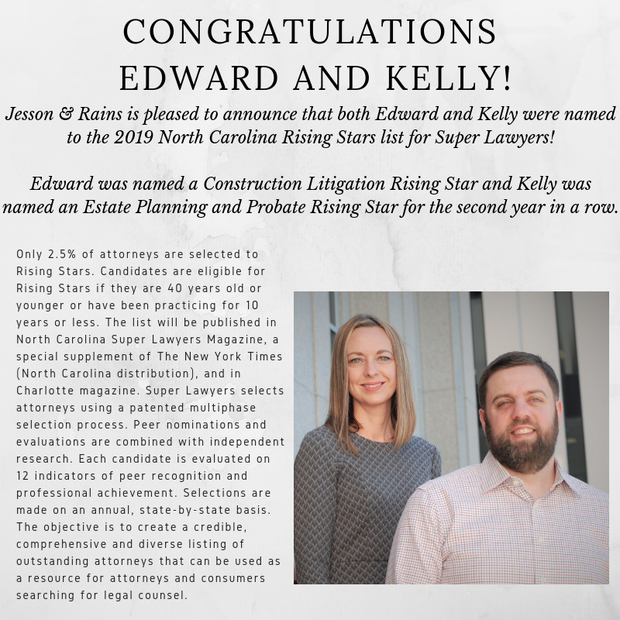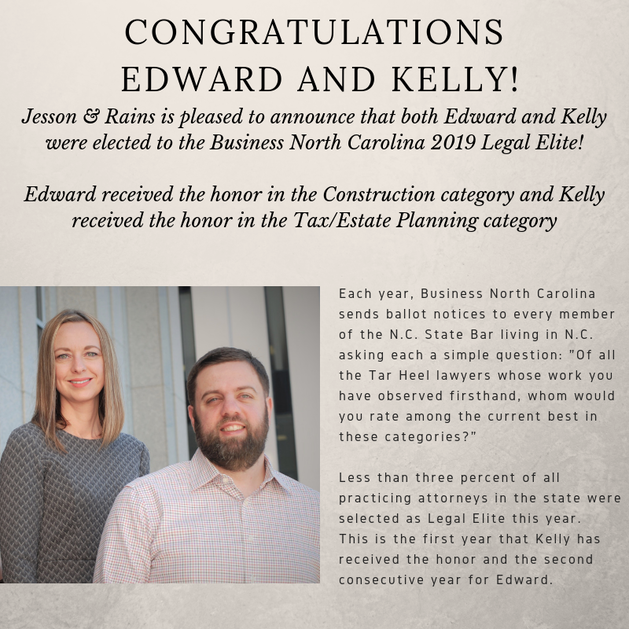|
Kelly will be co-hosting a complimentary estate and retirement planning seminar with Joe Roseman, Jr. Managing Partner, who will be talking about retirement, at the Morrison Regional Library.
Sign up today! *Determine if a TRUST is right for YOU *Avoid the most common mistakes retirees make with their estate plan *Reduce future costs and taxes for your FAMILY *Understand how to avoid letting the NURSING HOME take your house *Discover powerful retirement and estate strategies you never knew existed RSVP using this link: RSVP for Estate Planning Seminar #estateplanning
0 Comments
Written by Jesson & Rains attorney, Kelly Rains Jesson
This is the third installment out of our intellectual property series. The fourth and final article will be about protecting trade secrets and confidential information using contracts. A patent is a federally-issued form of intellectual property protection granted to inventors of unique designs and processes. The patent prevents other individuals and companies from making or selling the invention for 14 to 20 years. An inventor must apply for a patent within one year of publicly disclosing the invention. A patent is public record information, so while the invention is protected, it is not secret. The two main types of patents are utility patents and design patents. A utility patent is a machine, process, or component part thereof used to make a product. A design patent is the unique design of the product itself. The design patent covers only the appearance of the product and not the structural or functional features (that would be a utility patent). An example of a design patent is a glass soda bottle. A design patent lasts for fourteen years. A utility patent is the most common type of patent. In addition to machines, processes, and component parts, utility patents are also issued for inventors of improved existing patents. The improvement must be non-obvious to a person having ordinary skill in the same area of technology related to the invention. For example, a person cannot simply change the color of a machine and get approved for a new patent. Utility patents must be useful, serve a legal purpose, and be “novel.” If a substantially similar process or product has been marketed in the past year, the application will be rejected. It must be man-made—naturally occurring things cannot be patented. Also, the product or process must actually work. Patents will not be issued for ideas, theories, and inventions that do not work. A utility patent lasts for twenty years. Unlike copyrights and trademarks, there are no state versions of patents (only federal) and there is no common law protection. You do not get a patent simply by inventing something—you must apply and be granted a patent by the federal government. If you have any questions about protecting your intellectual property, give Jesson & Rains a call! - By Jesson & Rains Associate Attorney, Danielle Nodar
The beginning of a new year lends itself to reflecting on the year that has passed and setting goals for the future. Come January, we are bombarded with information about New Year’s resolutions and implementing plans to help us transform our resolutions from lofty dreams to our reality. From health goals relating to diet and fitness, financial goals such as saving for retirement or paying off longstanding debt, even decluttering our homes--there is no shortage of information about what we can do to improve our present and plan for our future. However, one area of planning that many people seem to put off is creating an estate plan. Estate planning involves meeting with an attorney to discuss things like your assets and debts and how they could impact your estate plan; how you want your property distributed at your passing; who will administer the probate of your estate; who will handle your financial affairs and medical decisions if your become incapacitated and are no longer able to make those decisions on your own; and other important decisions that could make a lasting impact on your loved ones. Even if you have an estate plan in place, you should meet with your estate planning attorney every three to five years to review any life changes or changes in the law. Some reasons to update an estate plan are:
If you have had any major life changes or just want to ensure that your estate plan is in order, make it a goal for 2019 to plan for your future and the future of your loved ones with estate planning. We can help you to ensure that your property is distributed how and to whom you want it to be distributed and to ensure that you are leaving your family unburdened. |
Subscribe to our newsletter.AuthorKelly Rains Jesson Categories
All
Archives
July 2024
|
|
SERVICES |
SUPPORT |
©Jesson & Rains, PLLC ALL RIGHTS RESERVED.






 RSS Feed
RSS Feed

